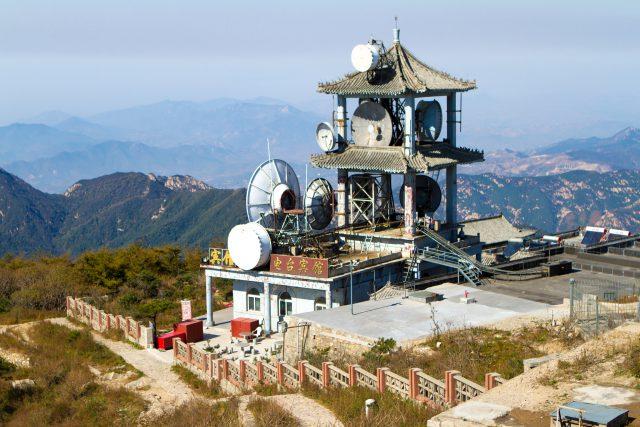The coming of China’s Space Silk Road
Posted By Malcolm Davis on August 11, 2017 @ 12:30

China looks set to add a ‘Space Silk Road’ to its proposed land-based Silk Road Economic Belt and the 21st-Century Maritime Silk Road, expanding the Belt and Road Initiative [1] (BRI; formerly known as One Belt, One Road) into orbit.
At the heart of the Space Silk Road, BRI states would subscribe to use China’s Beidou satellites for precision navigation and timing services. China had 23 [2] operational satellites in orbit as of 2016 and continues to expand the Beidou system. Precision navigation and timing (PNT) satellites like Beidou are key enabling [3] technologies that can drive local economies and coordinate communications. Such systems enable [4] (PDF) diverse applications including mobile devices, and the use of precision timing can support stock market applications and financial services, coordinate rail and marine transportation management, and support mining, among many other industries. The 2016 Chinese white paper on space activities [5] emphasises the importance of Beidou, stating:
With sustained efforts in building the Beidou global system, we plan to start providing basic services to countries along the Silk Road Economic Belt and 21st-Century Maritime Silk Road in 2018, form a network consisting of 35 satellites for global services by 2020, and provide all clients with more accurate and more reliable services through advancing the ground-based and satellite-based augmentation systems in an integrated way. (Part III, section 2 ‘Space infrastructure’)
It then goes on to specifically mention the concept of a Space Silk Road, announcing plans to establish a ‘Belt and Road Initiative Space Information Corridor’, which would include:
earth observation, communications and broadcasting, navigation and positioning, and other types of satellite-related development; ground and application system construction; and application product development. (Part V, section 3 ‘Key areas for future cooperation’)
A China Real Time Report [6] in the Wall Street Journal refers to Beidou as the ‘digital glue’ for the roads, railways, ports and industrial parks that China builds to extend its presence and influence. Chinese provision of satellite communications, weather monitoring and earth observation add to this vision for a Space Silk Road that overarches and underpins the Belt and Road Initiative. By signing up to the BRI ‘Space Information Corridor’, the BRI states would become dependent on Chinese-provided space services. That would give Beijing greater power to influence the policy choices of those states, because it would control the vital space capabilities that sustain their economic growth.
The US and its allies shouldn’t accept Chinese domination of Eurasia from space. The prospect of new space capabilities emerging from the ‘Space 2.0’ revolution that is now gathering pace makes competition in space with China less risky than it would have been in the past. First, unlike Beidou, the US GPS satellite system is already fully established and can be offered commercially to BRI states either for free or on competitive terms. Second, one of the biggest transformations in satellite communications in coming years will be mega-constellations (see here [7] and here [8]) to provide a low-earth orbit (LEO) based ‘broadband in the sky’ that can outperform traditional communications satellites such as those likely to be offered by Beijing.
Space imaging companies such as Planet [9] and DigitalGlobe [10] already provide high-resolution commercial space imagery. And the emerging ‘internet of things’ is likely to be enabled through constellations of CubeSats. Australian company Fleet [11] is moving towards establishing itself as an important player in that aspect of the future globalised economy.
Most importantly, these space capabilities are either being developed, in place or on the horizon, and they won’t be operated by Beijing. The impact of Space 2.0 technologies would enable greater sovereign space capability for states, rather than dependency on external providers.
Reusable launch capabilities are rapidly evolving. More companies are developing reusable rocket and airborne launch services that open the prospect for dramatic reductions in launch costs in the future. It’s getting cheaper to get into space, and that enables wider access to space for more customers, and will end the dominance of the state on the high frontier. So there’s no need for BRI states to simply accept Chinese control of access to space for their growing economies as part of signing up to the BRI. The West needs to promote Space 2.0 capabilities to BRI states rather than accept Chinese domination of that market.
Space competition can be seen as an extension to terrestrial geopolitics, and control of the high ground of space allows domination of earth because if information is the basis of 21st century power, space is the domain through which that information will flow. A Chinese Space Silk Road would add a new layer of Chinese power and control over much of Eurasia and, unchallenged, would lock out Western companies and ensure Beijing was the sole provider of space services to BRI states. That would ultimately lock in Chinese control of BRI economies. That’s never going to be a good outcome for the US in its broader competition with China for strategic primacy in Asia. It’s also completely unnecessary given the rapidly changing nature of the global space industry.
Article printed from The Strategist: https://aspistrategist.ru
URL to article: /coming-chinas-space-silk-road/
URLs in this post:
[1] Belt and Road Initiative: /bri-chinas-new-regional-strategy/
[2] 23: https://www.wired.com/2016/06/rocket-launch-brings-china-one-step-closer-gps/
[3] enabling: http://gpsworld.com/the-economic-benefits-of-gps/
[4] enable: http://www.performance.noaa.gov/wp-content/uploads/2015-08-31-Phase-1-Report-on-GPS-Economic-Value.pdf
[5] white paper on space activities: http://english.gov.cn/archive/white_paper/2016/12/28/content_281475527159496.htm
[6] China Real Time Report: https://blogs.wsj.com/chinarealtime/2016/12/28/chinas-one-belt-one-road-takes-to-space/
[7] here: http://www.bbc.com/news/science-environment-40422011
[8] here: http://www.satellitetoday.com/telecom/2017/05/04/spacex-outlines-plans-high-speed-broadband-mega-constellation/
[9] Planet: https://www.planet.com/
[10] DigitalGlobe: https://www.digitalglobe.com/
[11] Fleet: https://vimeo.com/176688249
Click here to print.